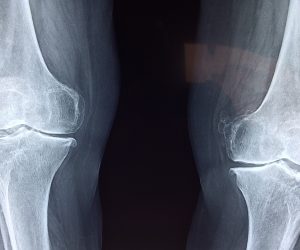
Hyperthyroidism vs. Hypothyroidism: How to Tell the Difference
Annie Price, CHHC via Dr. Axe – Thyroid problems can affect anyone of any age from infancy to the latest years of life. According to the American Thyroid Association, over 12 percent of the U.S. population will develop a thyroid condition at some point.
Currently, an estimated 20 million Americans have a form of thyroid disease and as many as 60 percent of those with thyroid disease are not even aware that they have a problem! In addition, women are five to eight times more likely than men to have thyroid problems.
With stats like these, it’s really important to know the signs of hypothyroidism vs. hyperthyroidism since these are two of the most common thyroid issues today. What are the signs and symptoms of hyperthyroidism and hypothyroidism? To some degree, hyperthyroidism vs. hypothyroidism symptoms can be somewhat opposite as you’re about to see, but there’s more to it than that. Once you figure out if you’re dealing with hypothyroidism vs. hyperthyroidism, you can figure out a treatment plan. Thankfully, there are many natural ways to treat hypothyroidism as well as hyperthyroidism.
Hyperthyroidism vs. Hypothyroidism
The thyroid is a small gland located at the base of your neck, sometimes described as butterfly-shaped. Meanwhile, at the base of the brain sits the pituitary gland, which secretes the thyroid-stimulating hormone (TSH). TSH makes the thyroid produce and release thyroxine, the main thyroid hormone.
In one way or another, your thyroid is connected to the way every organ in your body functions. Hypothyroidism and hyperthyroidism are the two conditions that affect how an improperly working thyroid might cause symptoms throughout the body.
If you suspect you have a thyroid problem, it’s helpful to know the difference between hypothyroidism vs. hyperthyroidism symptoms so you can discuss what you’ve been experiencing with your healthcare provider. These symptoms are definitely not something to ignore and left untreated; a thyroid problem can get worse.
Symptoms of Hyperthyroidism
When you produce too much thyroid hormone, you can develop hyperthyroidism. Some of the causes of hyperthyroidism include Grave’s disease, a swollen thyroid or thyroid nodules.
There are many signs and symptoms your doctor may recognize as being caused by hyperthyroidism, including:
• Unintentional weight loss, even when your appetite and food intake stay the same or increase
• Rapid heartbeat (commonly more than 100 beats per minute)
• Irregular heartbeat
• Heart palpitations
• Increased appetite
• Nervousness, anxiety and irritability
• Tremor (typically a fine trembling in your hands and fingers)
• Sweating
• Changes in menstrual patterns
• Increased sensitivity to heat
• Changes in bowel patterns, especially more frequent bowel movements
• An enlarged thyroid gland (goiter), which may appear as a swelling at the base of your neck
• Fatigue, muscle weakness
• Difficulty sleeping
• Skin thinning
• Fine, brittle hair
According to Mayo Clinic, “Older adults are more likely to have either no signs or symptoms or subtle ones, such as an increased heart rate, heat intolerance and a tendency to become tired during ordinary activities.” If left unchecked, people with hyperthyroidism can lose bone density and develop an irregular heartbeat, increasing their risk for stroke.
Symptoms of Hypothyroidism
The opposite of an overactive thyroid is, logically, an underactive thyroid. If your physician tests you for hypothyroidism, it’s likely you’re experiencing symptoms such as:
• Fatigue
• Increased sensitivity to cold
• Constipation
• Dry skin
• Weight gain
• Puffy face
• Hoarseness
• Muscle weakness
• Elevated blood cholesterol level
• Muscle aches, tenderness and stiffness
• Pain, stiffness or swelling in your joints
• Heavier than normal or irregular menstrual periods
• Thinning hair
• Slowed heart rate
• Depression
• Impaired memory
• Enlarged thyroid gland (goiter)
Hyperthyroidism vs. Hypothyroidism Labs
As you can see from these lists of symptoms, there is a pretty large difference between hypothyroidism and hyperthyroidism symptoms, but to determine for sure which health concern you may or may not be dealing with, it’s important to have lab work done.
Your doctor will test your blood levels of thyroid-stimulating hormone (TSH) and thyroxine. There are clear differences in hypothyroidism vs. hyperthyroidism lab values, especially hyperthyroidism vs. hypothyroidism TSH levels. A low level of thyroxine and high level of TSH can indicate an underactive (hypo) thyroid. High levels of thyroxine and low or nonexistent levels of TSH can mean you have an overactive (hyper) thyroid.
What is the TSH level for hyperthyroidism? The “normal range” for the TSH test can vary between labs, but it’s usually between 0.5 to 4.0–5.5 milli-international units per liter (mIU/L). Hyperthyroidism may be suspected by your doctor if your TSH level is below 0.5, but additional testing is needed. According to Christian Nasr, MD of Cleveland Clinic, “As long as your TSH is not lower than 0.1 and you do not have high T4 or T3 and you do not have symptoms of hyperthyroidism, then you could continue to have the TSH monitored every six months. No intervention is needed.”
What level of TSH indicates hypothyroidism? If your TSH is high (over 4.0) on repeat tests, this can indicate that your thyroid is not producing enough thyroid hormone and you may have hypothyroidism. If you have hypothyroidism, other thyroid function tests, including free T4 and free T3, will also be low.
It’s important to know a TSH test alone does not tell you why your TSH levels are too high or too low. If you receive abnormal TSH results, your doctor should request more labs that hone in on the differences between hyperthyroidism vs. hypothyroidism pathophysiology, including:
• T4 thyroid hormone tests
• T3 thyroid hormone tests
• Tests to diagnose Graves’ disease, an autoimmune disease that causes hyperthyroidism
•Tests to diagnose Hashimoto’s thyroiditis, an autoimmune disease that causes hypothyroidism
Hyperthyroidism vs. Hypothyroidism Treatment
Is hypothyroidism curable? There is no cure for a hypothyroidism diagnosis, but there may be ways to naturally increase thyroid hormone production through dietary means, such as a hypothyroidism diet. The conventional treatment for hypothyroidism is levothyroxine sodium tablets, also known as Synthroid. This medication is taken as a synthetic hormone replacement to help regulate thyroid levels. Doctors typically recommend taking this medication daily for the rest of one’s life.
The first step in natural treatment of hypothyroidism is to eliminate the causes of thyroid dysfunction, such as inflammation, overuse of medications, nutrient deficiencies and changes in hormones due to stress. The hypothyroidism diet eliminates foods that can cause inflammation and immune reactions and instead focuses on foods that help heal the GI tract, balance hormones and reduce inflammation.
What about conventional treatment of hyperthyroidism? There are medications commonly prescribed to limit the activity of a hyper thyroid such as Methimazole or Propylthiouracil (PTU). Surgery may be another conventional recommendation as a last resort to remove all or part of the thyroid if anti-thyroid medications do not work. It’s worth researching ways to treat hyperthyroidism naturally, as removing sources of inflammation from your diet and taking advantage of thyroid-supporting supplements and essential oils may help make a huge difference.
Hyperthyroidism vs. Hypothyroidism: Which is Worse?
These are two different conditions and one isn’t necessarily “worse” than the other. In the United States, hypothyroidism is more common than hyperthyroidism. Some experts think that hypothyroidism is more difficult to manage, but hyperthyroidism may cause more immediate problems. If you suspect you have either condition, it’s very important to see your healthcare provider right away.
Can You Have Hypothyroidism and Hyperthyroidism at the Same Time?
It is not possible to have both hypothyroidism and hyperthyroidism at the same time. However, it is possible to go back and forth between these two thyroid problems.
If you are currently receiving treatment for a thyroid problem and your thyroid function begins to shift between underactive and overactive, your medication may be the cause and you should talk to your doctor right away.
This is according to Marius Stan, M.D. of Mayo Clinic who also explains, “If you don’t have a history of thyroid problems, the most common reason for a change in thyroid function is inflammation of the thyroid gland (thyroiditis). Initially, thyroiditis leads to overactive thyroid function because when the thyroid first becomes inflamed, it releases all its stored hormones. After that, the thyroid slowly begins to return to normal, but it doesn’t maintain its usual hormone production. So once the hormone stores are depleted, hypothyroidism develops. Its outcome depends on the type of thyroiditis, as follows.”
Dr. Stan goes on to explain that there are two types of thyroiditis, subacute thyroiditis and silent thyroiditis. Subacute thyroiditis is caused by a virus and includes pain that starts at the front of the neck and spreads toward the ears. Subacute thyroiditis often resolves on its own without any lasting problems. Silent thyroiditis is a painless autoimmune condition in which the immune system attacks thyroid tissue. With this type of thyroiditis, thyroid function can go back to normal after an initial episode, but it can happen again and over time, it can turn into a long-term case of hypothyroidism.
Final Thoughts
• Both hyperthyroidism and hypothyroidism involve a malfunctioning thyroid gland and either condition can affect the entire body since the thyroid is so crucial to our health.
• When comparing hyperthyroidism vs. hypothyroidism, there are noticeable differences in symptoms; for example, people with hyperthyroidism often experience unintentional weight loss while those with hypothyroidism tend to have weight gain.
• Can you have hypothyroidism and hyperthyroidism at the same time? No, but you can go back and forth between the two diagnoses and this can be caused thyroid medications as well as thyroiditis, which is inflammation of the thyroid gland.
• The key differences between hypothyroidism vs. hyperthyroidism labs are the levels of TSH and thyroxine as well as T3 and T4 hormone levels.
• It’s important to get thorough blood work, and even repeat blood work, to ensure you are getting a proper and clear diagnosis of your thyroid problem.
To read the original article click here.
For more articles from Dr. Axe click here.






